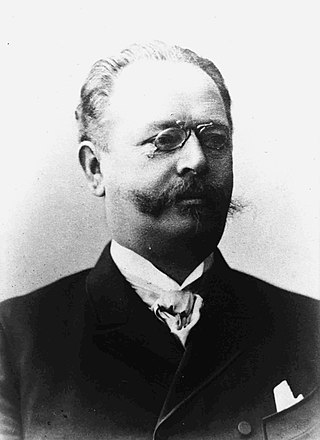Top Qs
Timeline
Chat
Perspective
Heinrich Ernst Göring
German diplomat (1839–1913) From Wikipedia, the free encyclopedia
Remove ads
Heinrich Ernst Göring (31 October 1839 – 7 December 1913) was a German jurist and diplomat who served as colonial governor of German South West Africa. He was the father of five children including Hermann Göring, the Nazi leader and commander of the Luftwaffe (German Air Force).
Remove ads
Remove ads
Early life
Göring was born in Emmerich am Rhein. He was the son of Wilhelm Göring (1791–1874), and his wife, Caroline Maria de Nerée (1815–1886).[2]
Career
Summarize
Perspective
After a career as a provincial judge, the Dutch-speaking Göring was appointed as the first Imperial Commissioner of German South West Africa in 1885. (German commercial interests had forced the Imperial Chancellor, Otto von Bismarck, into creating a state-financed colonial administration to support his country's fledgling Protectorate of South West Africa.[3])
Göring started by signing a "protection treaty" with the leading Herero chief, Maharero.[4] The treaty of protection was not worth the paper on which it was written, as Göring was in no position to offer assistance. Repeated armed attacks by Witbooi's Nama clan proved the point. The treaty was repudiated a few years later by Maharero, who also expelled Göring from Hereroland. The Germans' behaviour had become too much, and, worst of all, Göring had (perhaps unwittingly) extended his house on top of a Herero ancestral graveyard. An alleged discovery of gold c. 1887 was a hoax: the purported gold deposits were nothing apart from the remains of gold pieces fired at a rock face. The identity of the hoaxer remains a mystery, but suspicion falls on Göring making a last-ditch desperate attempt to bring investment to the protectorate and thus to save his failing mission.[5]
Göring left South West Africa in August 1890 without having been able to settle the constant friction between the Herero and the Oorlam people.[6] The expected vast gold deposits started a gold rush of German settlers and investors, whose behaviour further alienated the Herero. This eventually led to the Herero and Namaqua genocide (1904–1908). Herero skulls were eventually used by the Kaiser Wilhelm Institute of Anthropology, Human Heredity, and Eugenics, which pursued a policy of eugenics.[1]
From 1892 to 1895, Göring resided in Haiti's capital, Port-au-Prince, as the German resident minister for Haiti and the Dominican Republic.[7]
Remove ads
Personal life
Göring married, secondly, to Franziska Tiefenbrunn: the marriage produced five recorded children:[8]
- Karl-Ernst Göring (1885––1932), a jurist.[2]
- Olga Therese Sophie Göring (1889–1970)[2]
- Paula Elisabeth Rosa Göring (1890–1960)[2]
- Hermann Göring (1893–1946), German politician, military leader, and leading member of the Nazi Party.
- Albert Göring (1895–1966), businessman.[2]
References
Bibliography
External links
Wikiwand - on
Seamless Wikipedia browsing. On steroids.
Remove ads

